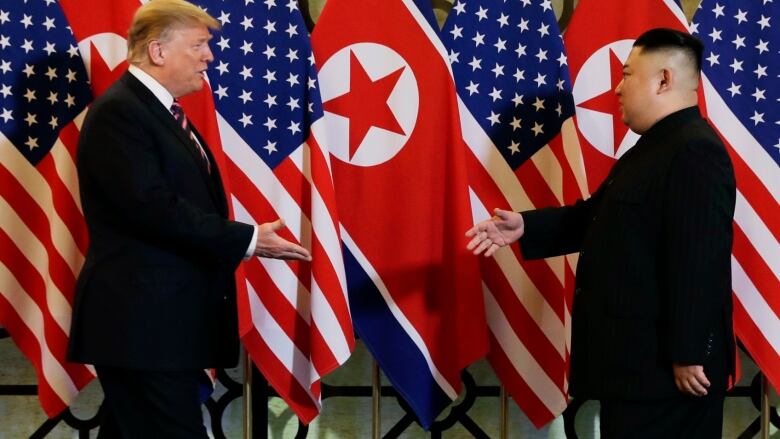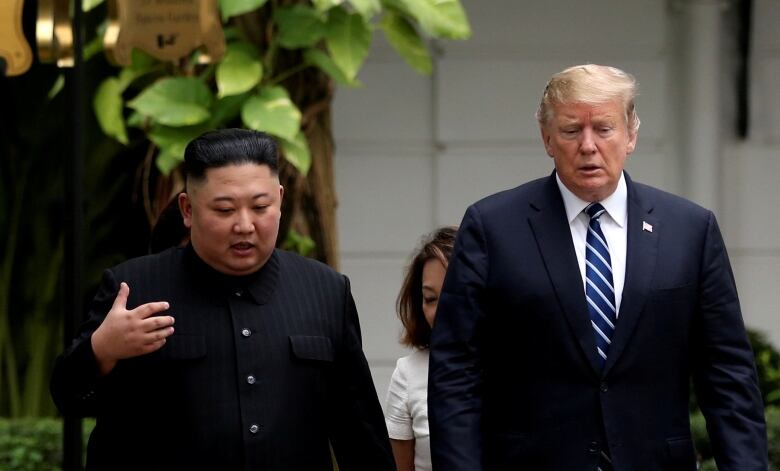Trump's direct engagement with North Korea is the first big idea on the file in decades
Much as only President Nixon could go to China, perhaps only Trump could go to North Korea

On the sidelines of the 2011 Halifax International Security Forum, the late U.S. Senator John McCain was overheard by this writer remarking to a delegate of the South Korean government, with more than a hint of frustration, that "we have been talking to the North [Koreans] for 40 goddamn years, and what have we to show for it?"
Indeed, the issue of North Korea has long flummoxed successive U.S. administrations, due in no small part to the doctrinal paralysis and lack of imagination among U.S. policymakers. Perhaps, then, President Donald Trump's outreach to North Korean leader Kim Jong-un maligned as it might be by the same trigger-happy "national security conservatives" who have brought us such gems as an interminable 17-year war in Afghanistan and the Iraq War adventure should not be discounted out of hand.
Much as only President Nixon could go to China, perhaps only Trump could go to North Korea and ultimately strike a deal that has long-eluded the U.S.
Record of cautious engagement
To say that the incrementalist approach to solving the problem of North Korea has been less than successful over the decades is something of an understatement. Sunshine policies, sanctions, six-party talks, isolation and joint visions have all ultimately been unable to dissuade or prevent the North from developing and acquiring nuclear weapons.
It has long been clear recall Sen. McCain's remarks above from nearly a decade ago that the same old approach of cautious engagement and sanctions was not cutting it; ineffectual policy, however, was all that Washington policymakers seemingly knew.
Over time, academic experts became wedded to their pet theories; movers-and-shakers in Washington were mired in a hidebound conventional wisdom, and career bean-counters were resplendent in the ensuing bureaucratic inertia. As the joke goes, ask a career diplomat in the State Department to describe the last four decades of North Korean policy, and one will get a cheerful "a good start!" in reply.
Revealing a distinct lack of imagination on the topic, Washington's thinking on North Korea seemingly devolved over the years to a binary choice between more of the same, or a let's-be-done-with-it military action. Big, innovative ideas have long eluded the much vaunted "adults in the room," who find themselves stuck in a policy rut of their own making.

In president Trump, however, a novel element has been introduced: a president unconstrained by decades of DC conventional wisdom or fealty to longstanding American foreign policy. One finds it hard to imagine a conventional president precipitating a historic meeting with the North at the DMZ through an almost flippant tweet.
Perhaps Trump's direct talks with Kim are the big idea missing in the last decades of U.S. policy. The notion had been floated before former President Barack Obama pledged in the 2008 presidential debates to meet with the North without preconditions before ultimately defaulting to Washington's standard operating procedure but it took the political blank slate of Trump to actually follow through.
Trump's approach has not been without criticism, of course. The invade-first-ask-questions-later wing of the Republican Party is naturally up in arms, fussing over perceived "weakness" in direct talks.Experts on North Korea, whose treatises have somehow not resulted in peace or moved the needle on U.S.-North Korean relations, pout about the meetings being a "propaganda victory" for Kim; complaints that carry just the tinge of saltiness over the fact that it was Trump, of all people, to come up with the first original thought on approaching the North in decades.
Aggrieved too are the career diplomats whose failure to solve the North Korea issue through a gormless conventional wisdom is hammered home with each grinning Trump-Kim handshake.
-
Trump becomes 1st sitting U.S. president to enter North Korea
-
U.S., North Korean officials holding talks to set up 3rd Trump-Kim summit, South Korea says
There has been the suggestion that Trump's outreach is nothing more than an opportunity for shallow photo-ops designed to flatter the president's ego not produce tangible results. Nor, perhaps, is Trump even concerned with a comprehensive deal with the North; the boring nuts-and-bolts diplomacy cast asidein favour of splashy PR moves. Not entirely unfair criticisms given the president's short attention span and penchant for gaudyshowmanship
It is, of course, a bit rich for the same Very Serious People whose decades of Very Serious Diplomacy proved fruitless to criticize the speed at which current efforts are moving. It also reveals a certain institutional tunnel-vision.
The traditional bottom-up approach, wherein the "small ball" of traditional diplomacy leads to a grand summit between leaders was not going anywhere. Even if the Trump-Kim meetings are little more than photo-ops, they may nonetheless have a practical purpose: by working from the top down, both leaders can do an end-run around the diplomatic logjam and establish a personal rapport from those meetings not unlike that of Reagan and Gorbachev giving the technical negotiations below them a jolt.
Trump, uncharacteristically, has taken a continued personal interest and role in the talks with the North, frequently exchanging perfumed missives with Kim. Administration officials too continue to meet with their North Korean counterparts, indicating that the outreach by the president runs deeper thana desirefor high-profilephoto-ops.
Perhaps, ultimately, Trump's gamble on North Korea will fail. Between decades of feckless traditional diplomacy and potentially disastrous military conflict, however, and in the absence of other innovative proposals, Trump's direct engagement with the North is at least a big idea worth trying.
This column is part of CBC's Opinion section. For more information about this section, please read ourFAQ.












_(720p).jpg)


 OFFICIAL HD MUSIC VIDEO.jpg)
.jpg)



























































































